Author Archives: João Tomé
Author Archives: João Tomé


In 2023, cybersecurity continues to be in most cases a need-to-have for those who don’t want to take chances on getting caught in a cyberattack and its consequences. Attacks have gotten more sophisticated, while conflicts (online and offline, and at the same time) continue, including in Ukraine. Governments have heightened their cyber warnings and put together strategies, including around critical infrastructure (including health and education). All of this, at a time when there were never so many online risks, but also people online — over five billion in July 2023, 64.5% of the now eight billion that are the world’s total population.
Here we take a look at what we’ve been discussing in 2023, so far, in our Cloudflare blog related to attacks and online security in general, with several August reading list suggestions. From new trends, products, initiatives or partnerships, including AI service safety, to record-breaking blocked cyberattacks. On that note, our AI hub (ai.cloudflare.com) was just launched.
Throughout the year, Cloudflare has continued to onboard customers while they were being attacked, and we have provided protection to many others, including once.net, responsible for the 2023 Eurovision Song Contest online voting system Continue reading
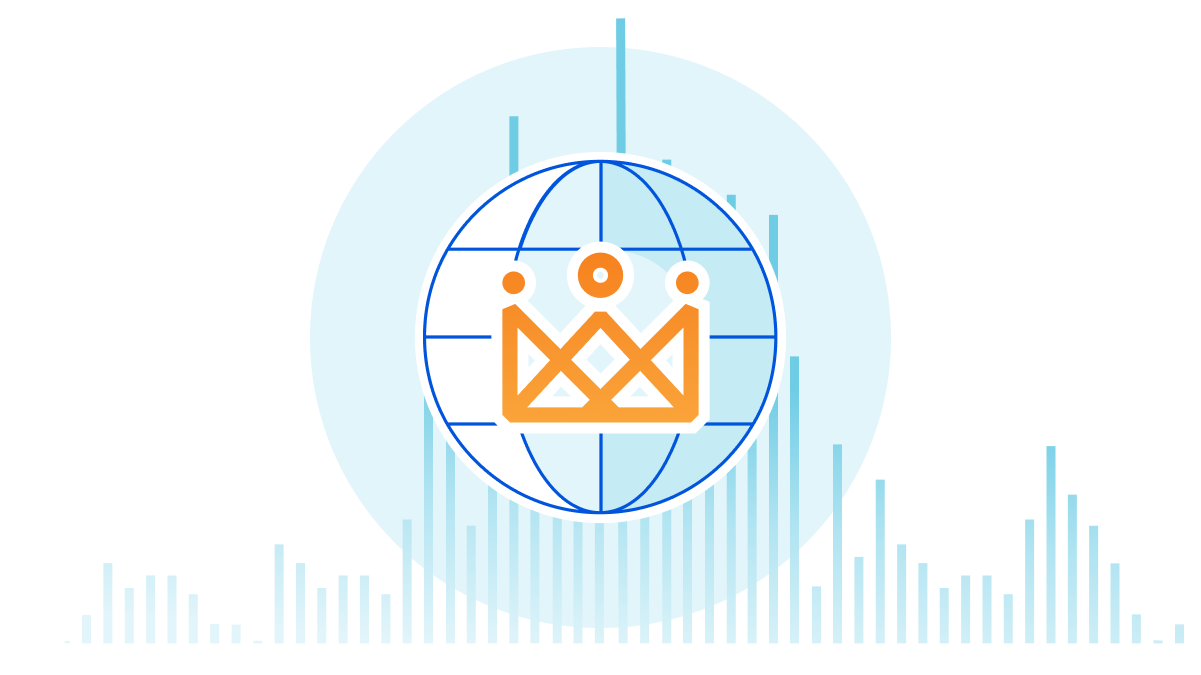
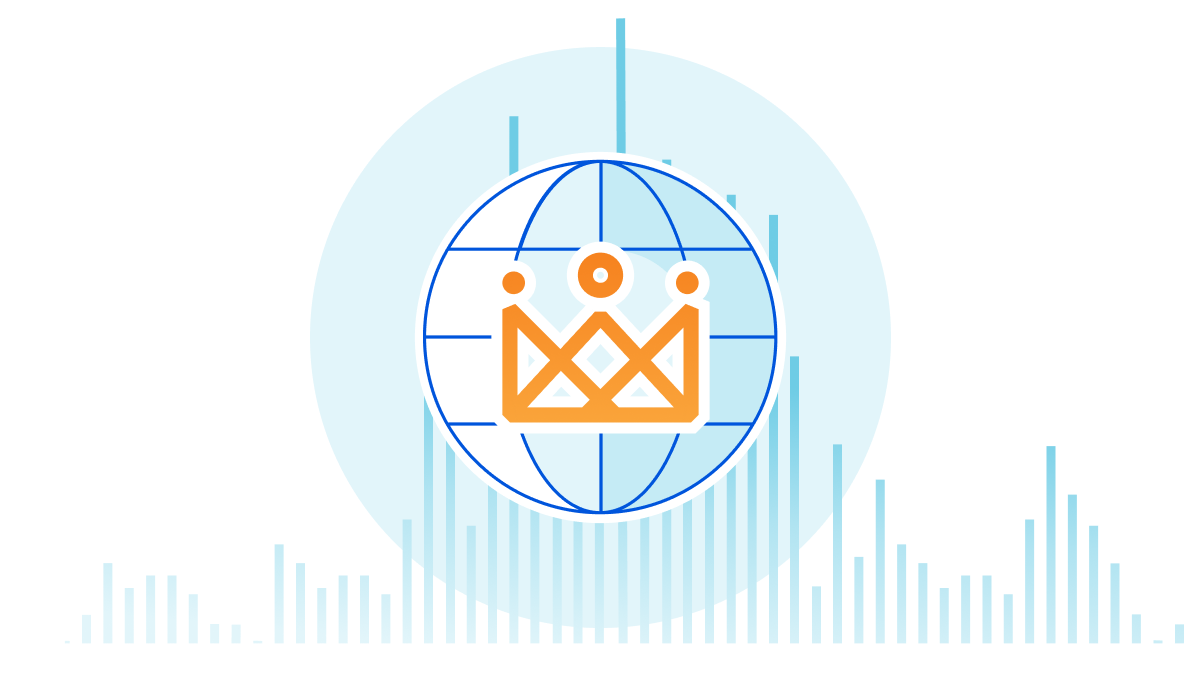
When major events in a country happen Internet traffic patterns are often impacted, depending on the type of event. But what about the coronation of a king or queen? There’s no similar precedent, with a worldwide impact, in the Internet age, except maybe the coronation of the king of Thailand, in 2019. The last time it happened in the United Kingdom was 70 years ago (June 2, 1953), with Queen Elizabeth II; it was the first British coronation to be fully televised. Neither the Internet nor ARPANET were around at the time.
Imagine a grand royal event (if you saw the broadcast or the news, there’s no need), filled with pomp and pageantry, that's so captivating it impacts Internet traffic. That's what happened during the coronation of Charles III and Camilla, the newly crowned king and queen of the United Kingdom and other Commonwealth realms. As the coronation ceremony unfolded, on Saturday morning, May 6, 2023, there were clear spikes and dips in traffic, each coinciding with key moments of the ceremony.
Then came Sunday, and with it, the Coronation Big Lunch event. As the nation sat down to enjoy a communal meal throughout the country, Internet traffic took a Continue reading


On Saturday, April 15, 2023, an armed conflict between rival factions of the military government of Sudan began. Cloudflare observed a disruption in Internet traffic on that Saturday, starting at 08:00 UTC, which deepened on Sunday. Since then, the conflict has continued, and different ISPs have been affected, in some cases with a 90% drop in traffic. On May 2, Internet traffic is still ~30% lower than pre-conflict levels. This blog post will show what we’ve been seeing in terms of Internet disruption there.
On the day that clashes broke out, our data shows that traffic in the country dropped as much as 60% on Saturday, after 08:00 UTC, with a partial recovery on Sunday around 14:00, but it has consistently been lower than before. Although we saw outages and disruptions on major local Internet providers, the general drop in traffic could also be related to different human usage patterns because of the conflict, with people trying to leave the country. In Ukraine, we saw a clear drop in traffic, not always related to ISP outages, after the war started, when people were leaving the country.
Here’s the hourly perspective of Sudan’s Internet traffic over the past weeks as seen Continue reading


As you wake up in the morning feeling sleepy and preoccupied, you receive an urgent email from a seemingly familiar source, and without much thought, you click on a link that you shouldn't have. Sometimes it’s that simple, and this more than 30-year-old phishing method means chaos breaks loose – whether it’s your personal bank account or social media, where an attacker also begins to trick your family and friends; or at your company, with what could mean systems and data being compromised, services being disrupted, and all other subsequent consequences. Following up on our “Top 50 Most Impersonated Brands in phishing attacks” post, here are some tips to catch these scams before you fall for them.
We’re all human, and responding to or interacting with a malicious email remains the primary way to breach organizations. According to CISA, 90% of cyber attacks begin with a phishing email, and losses from a similar type of phishing attack, known as business email compromise (BEC), are a $43 billion problem facing organizations. One thing is for sure, phishing attacks are getting more sophisticated every day thanks to emerging tools like AI chatbots and the expanded usage of various communication Continue reading


The Internet has become a significant factor in geopolitical conflicts, such as the ongoing war in Ukraine. Tomorrow marks one year since the Russian invasion of that country. This post reports on Internet insights and discusses how Ukraine's Internet remained resilient in spite of dozens of disruptions in three different stages of the conflict.
Key takeaways:
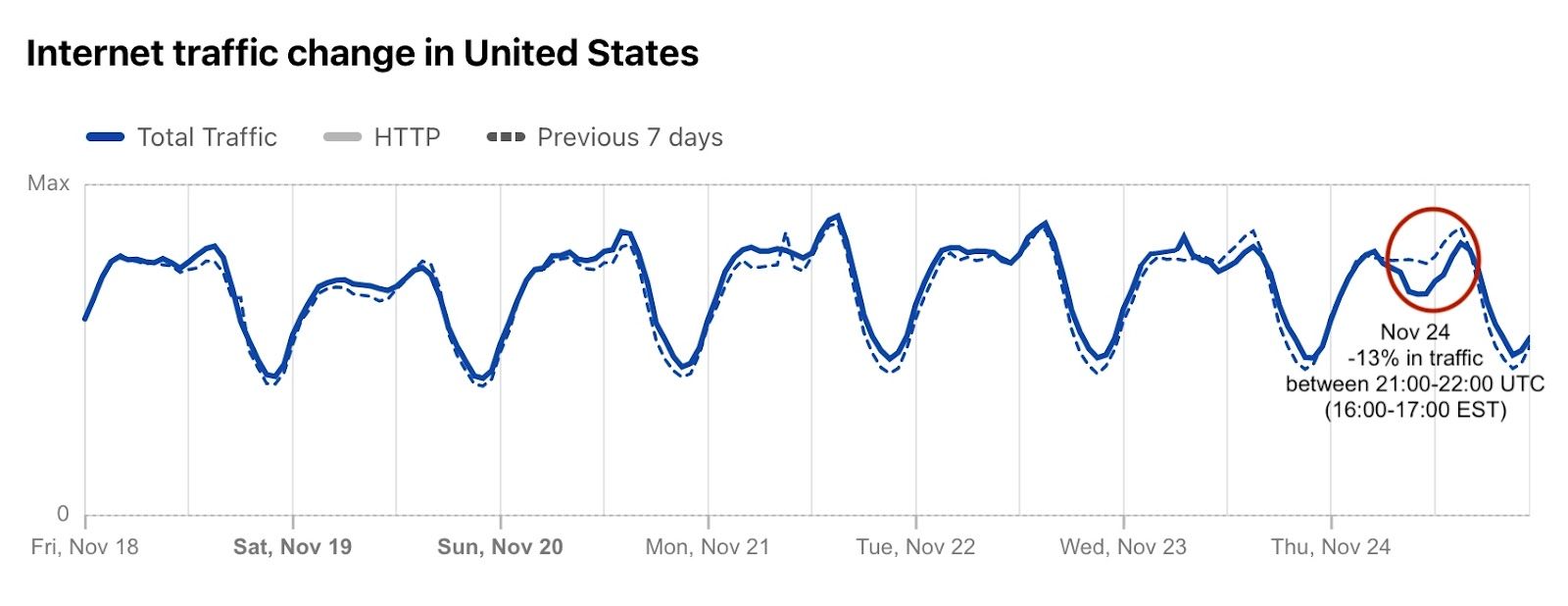
"The more you practice the art of thankfulness, the more you have to be thankful for."
— Norman Vincent Peale, American author
The turkey. The sweet potatoes. The stuffing. The pumpkin pie. Yesterday, November 24, 2022, was Thanksgiving Day in the US. A time for families and loved ones to be together and thankful, according to the tradition. Last year, we saw how the US paused shopping (and browsing) for Thanksgiving. So, how was it this year? Not only did we see Internet traffic go down (by 13%) during Thanksgiving dinner, but it was much higher than usual the day before and the day after (the Black Friday effect… so far). There was also a clear, but short, Thanksgiving day effect on e-commerce DNS trends.
We'll have to wait to see what Black Friday looks like.
Let’s start with Internet traffic at the time of Thanksgiving dinner. Although every family is different, a 2018 survey of US consumers showed that for 42% early afternoon (between 13:00 and 15:00 is the preferred time to sit at the table and start to dig in). But 16:00 seems to be the “correct time” — The Atlantic explains why.
That said, Cloudflare Continue reading
Brasil, sei lá
Ou o meu coração se engana
Ou uma terra igual não há
— From Tom Jobim’s song, Brasil Nativo

Brazil’s recent presidential election got significant attention from both global and national media outlets, not only because of the size of the country, but also because of premature allegations of electoral fraud. The first round of the Brazilian 2022 general election was held on October 2, and the runoff was held on Sunday, October 30. With 124 million votes counted, former president Lula da Silva (2003-2010) won with 50.9% of the votes, beating incumbent Jair Bolsonaro, who had 49.1% of the votes.

Using Cloudflare’s data, we can explore the impact that this election had on Internet traffic patterns in Brazil, as well as interest in content from election-related websites, news organizations, social media platforms, and video platforms.
Here are a few highlights: while the runoff generated much more interest to election related websites (we actually have a view to DNS queries, a proxy to websites), the first round showed bigger increases in traffic Continue reading
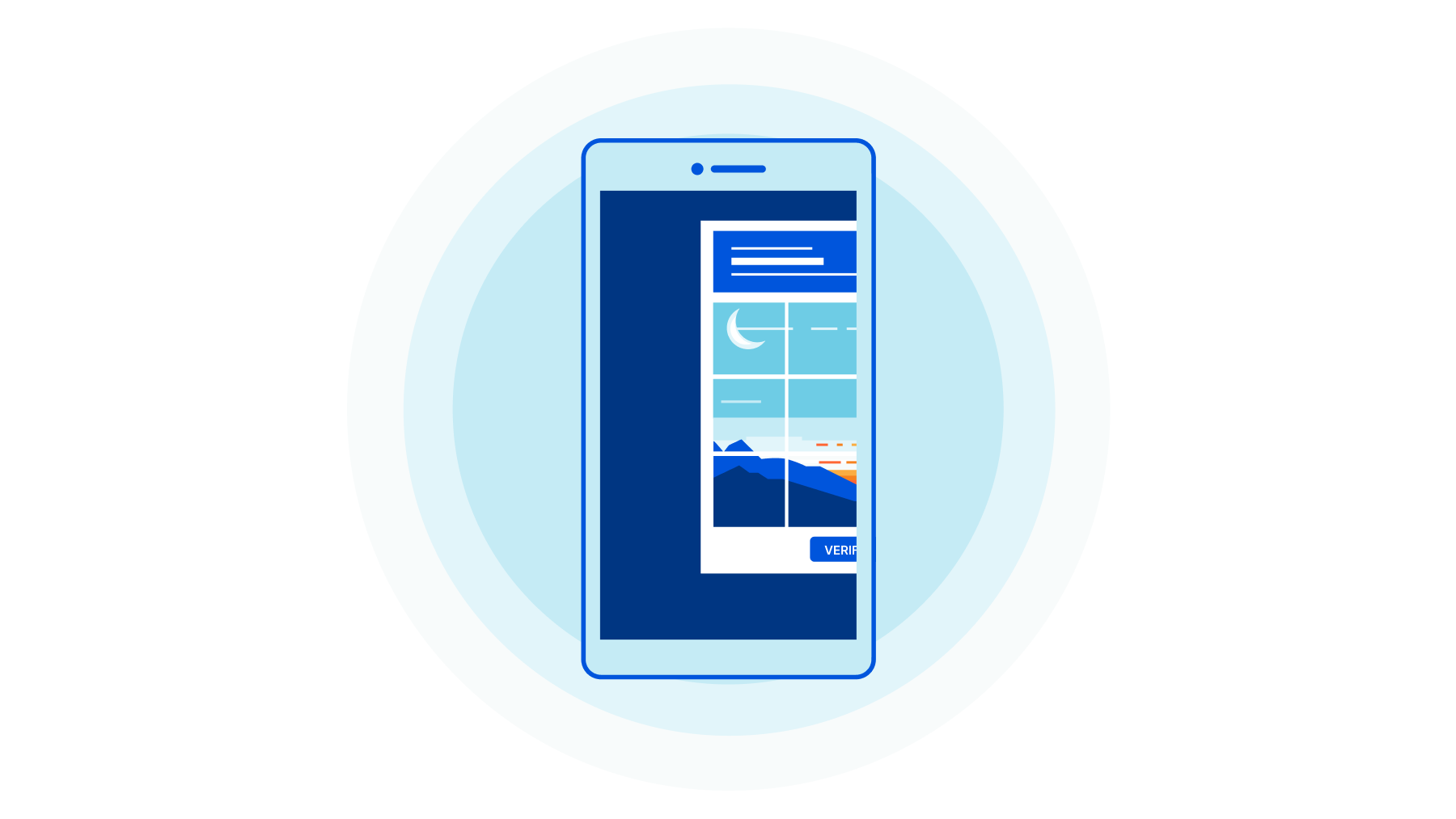
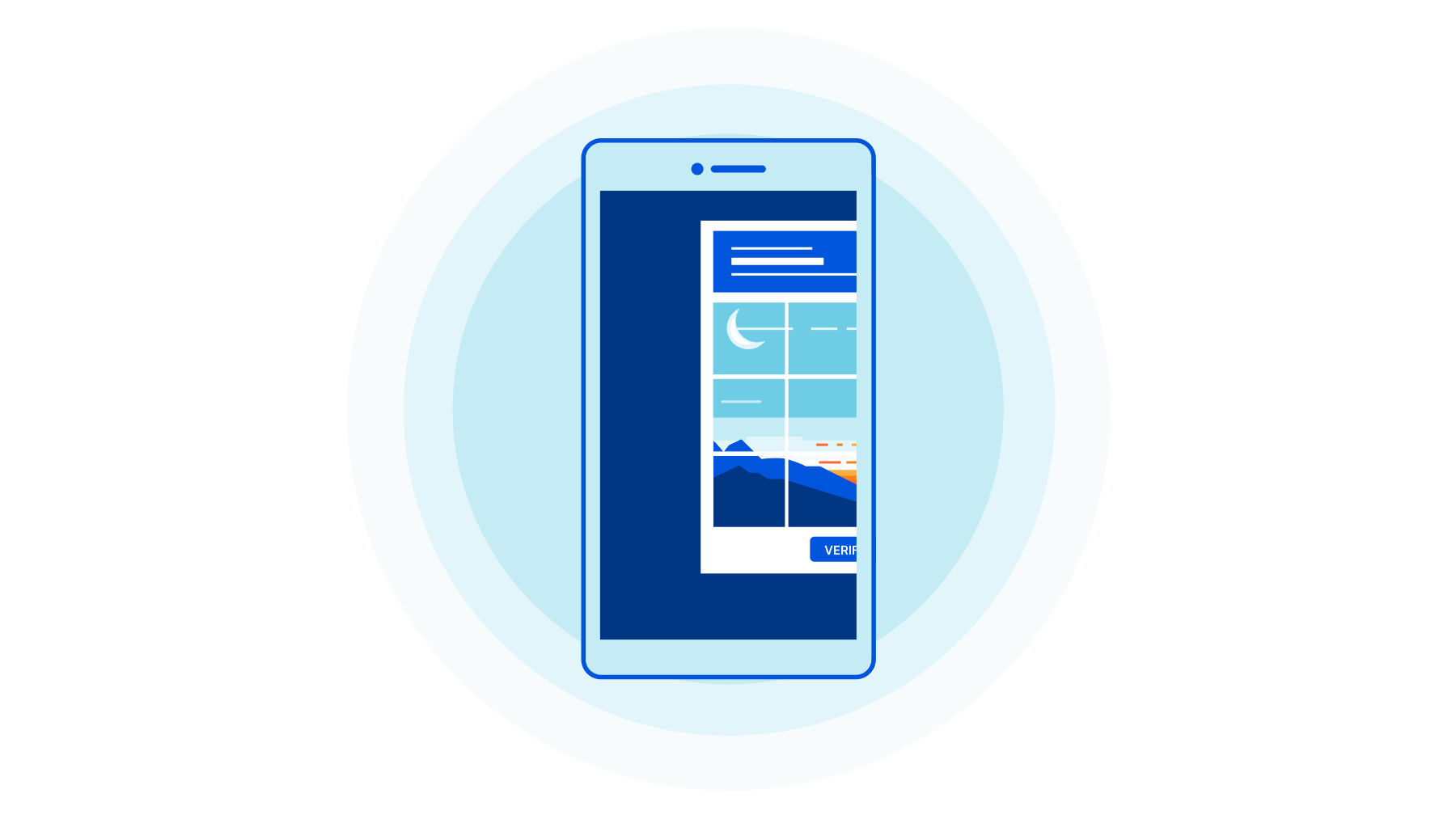
You go to a website or service, but before access is granted, there’s a visual challenge that forces you to select bikes, buses or traffic lights in a set of images. That can be an exasperating experience. Now, if you have iOS 16 on your iPhone, those days could be over and are just a one-time toggle enabled away.
CAPTCHA = "Completely Automated Public Turing test to tell Computers and Humans Apart"
In 2021 and 2022, we took direct steps to end the madness that wastes humanity about 500 years per day called CAPTCHAs, that have been making sure you’re human and not a bot. In August 2022, we announced Private Access Tokens. With that, we’re able to eliminate CAPTCHAs on iPhones, iPads and Macs (and more to come) with open privacy-preserving standards.
On September 12, iOS 16 became generally available (iPadOS 16 and macOS 13 should arrive in October) and on the settings of your device there’s a toggle that can enable the Private Access Token (PAT) technology that will eliminate the need for those CAPTCHAs, and automatically validate that you are a real human visiting a site. If you already have iOS 16, here’s what you should Continue reading


When August comes, for many, at least in the Northern Hemisphere, it’s time to enjoy summer and/or vacations. Here are some deep dive reading suggestions from our Cloudflare Blog for any time, weather or time of the year. There’s also some reading material on how the Internet works, and a glimpse into our history.
To create the list (that goes beyond 2022), initially we asked inside the company for favorite blog posts. Many explained how a particular blog post made them want to work at Cloudflare (including some of those who have been at the company for many years). And then, we also heard from readers by asking the question on our Twitter account: “What’s your favorite blog post from the Cloudflare Blog and why?”
In early July (thinking of the July 4 US holiday) we did a sum up where some of the more recent blog posts were referenced. We’ve added a few to that list:


In 2022, cybersecurity is a must-have for those who don’t want to take chances on getting caught in a cyberattack with difficult to deal consequences. And with a war in Europe (Ukraine) still going on, cyberwar also doesn’t show signs of stopping in a time when there never were so many people online, 4.95 billion in early 2022, 62.5% of the world’s total population (estimates say it grew around 4% during 2021 and 7.3% in 2020).
Throughout the year we, at Cloudflare, have been making new announcements of products, solutions and initiatives that highlight the way we have been preventing, mitigating and constantly learning, over the years, with several thousands of small and big cyberattacks. Right now, we block an average of 124 billion cyber threats per day. The more we deal with attacks, the more we know how to stop them, and the easier it gets to find and deal with new threats — and for customers to forget we’re there, protecting them.
In 2022, we have been onboarding many customers while they’re being attacked, something we know well from the past (Wikimedia/Wikipedia or Eurovision are just two case-studies of many, Continue reading

“Somewhere, something incredible is waiting to be known.” — Carl Sagan

In the past few years, space technology and travel have been trending with increased attention and endeavors (including private ones). In our 2021 Year in Review we showed how NASA and SpaceX flew higher, at least in terms of interest on the Internet.
This week, NASA in collaboration with the European Space Agency (ESA) and the Canadian Space Agency (CSA), released the first images from the James Webb Telescope (JWST) which conducts infrared astronomy to “reveal the unseen universe”.

So, let’s dig into something we really like here at Cloudflare, checking how real life and human interest has an impact on the Internet. In terms of general Continue reading

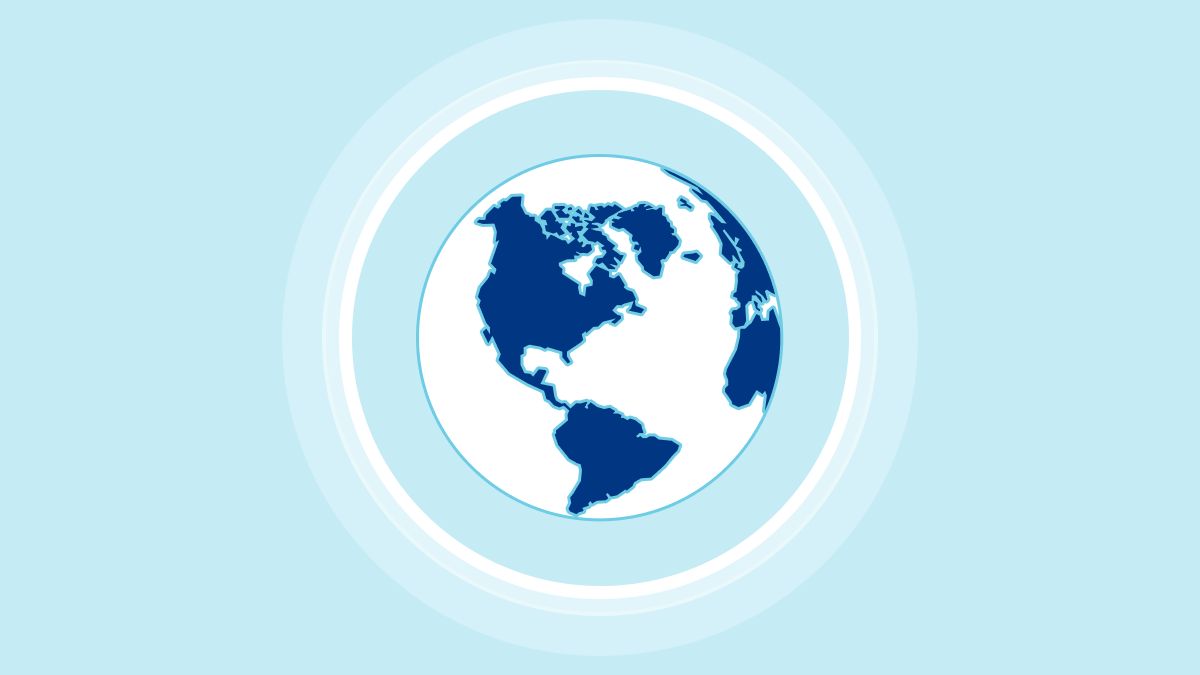
(Check for the latest updates at the end of this blog: Internet traffic started to come back at around July 9, 01:00 UTC, after 17 hours)
An outage at one of the largest ISPs in Canada, Rogers Communications, started earlier today, July 8, 2022, and is ongoing (eight hours and counting), and is impacting businesses and consumers. At the time of writing, we are seeing a very small amount of traffic from Rogers, but we are only seeing residual traffic, and nothing close to a full recovery to normal traffic levels.
Based on what we’re seeing and similar incidents in the past, we believe this is likely to be an internal error, not a cyber attack.
Cloudflare Radar shows a near complete loss of traffic from Rogers ASN, AS812, that started around 08:45 UTC (all times in this blog are UTC).
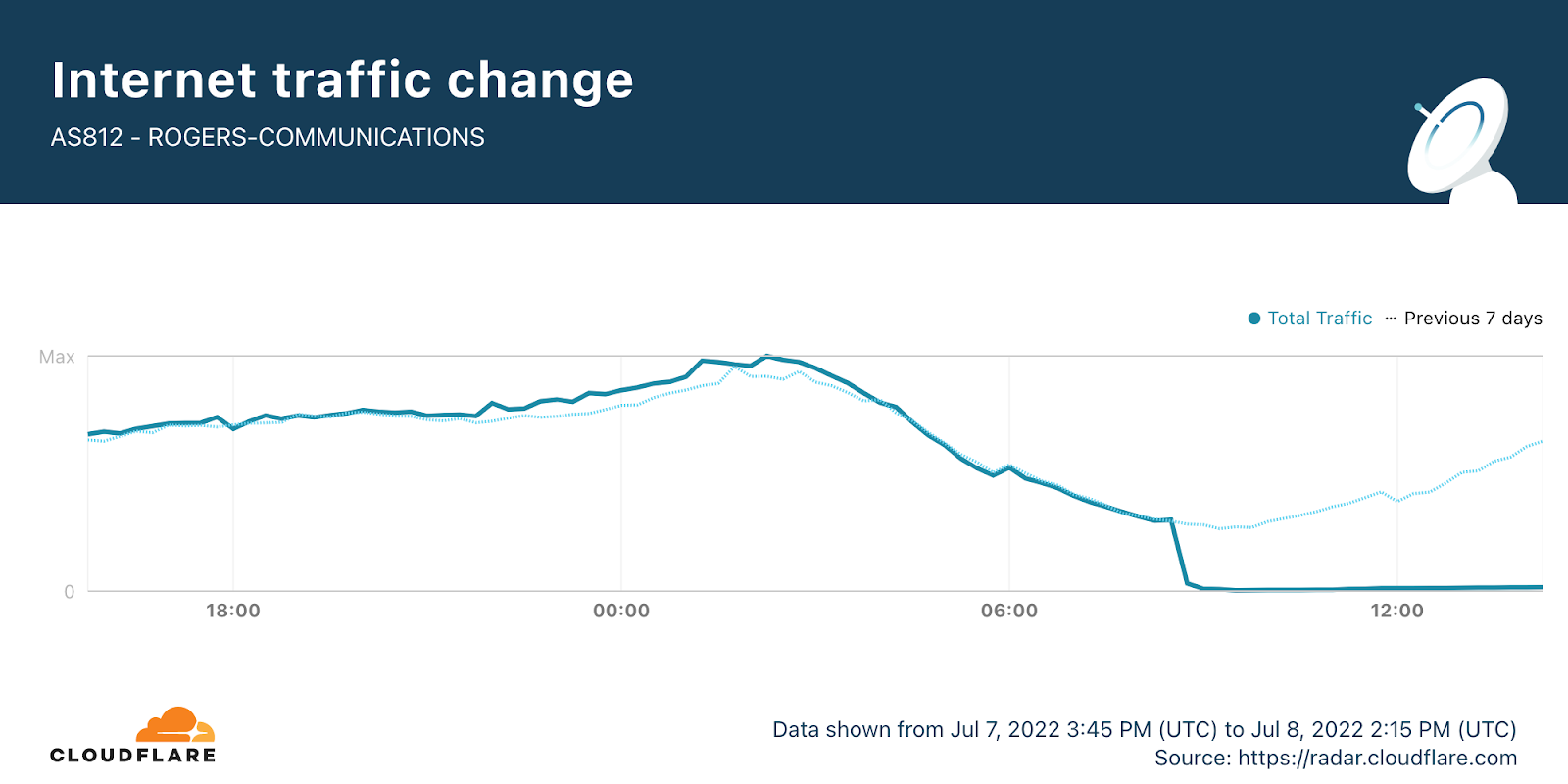
Cloudflare data shows that there was a clear spike in BGP (Border Gateway Protocol) updates after 08:15, reaching its peak at 08:45.
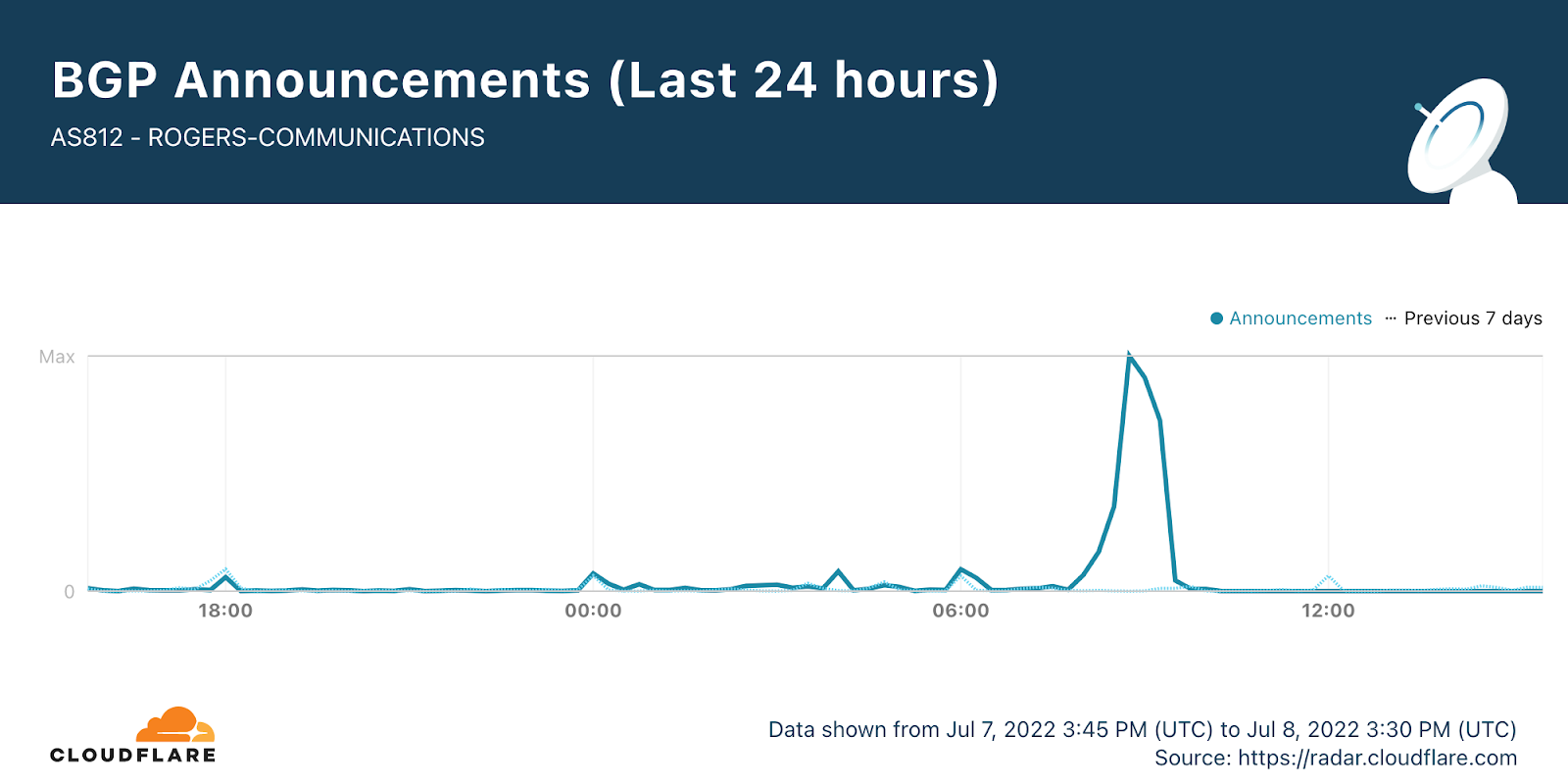
BGP is a mechanism to exchange routing information between networks on the Internet. The big routers that make the Internet work have huge, constantly updated lists of the possible routes that can be Continue reading

“I declare before you all that my whole life, whether it be long or short, shall be devoted to your service and the service of our great imperial family to which we all belong.”
— Queen Elizabeth II birthday speech, April 21, 1947

The rising and setting of the sun has an impact on human behaviour and on Internet trends, and events like this weekend's celebration of Queen Elizabeth II’s Platinum Jubilee also show up in Internet trends.
When Elizabeth II's reign started, on February 6, 1952 (the coronation was on June 2, 1953), the Turing machine had already been proposed (1936), and with that the basis for computer science. ARPANET, which became the technical foundation of the Internet, was still a dream that came to fruition in the late 60s — the World Wide Web is from 1989 and in 2014 we celebrated its Silver Jubilee. So, with that in mind, let’s answer the question: did the 2022 celebrations of the first British monarch with a 70th anniversary on the throne have an impact on the UK’s Internet traffic?
First, some details about the Platinum Jubilee. There was a four-day bank holiday (June 2-5) in the UK Continue reading


There’s only one song contest that is more than six decades old and not only presents many new songs (ABBA, Celine Dion, Julio Iglesias and Domenico Modugno shined there), but also has a global stage that involves 40 countries — performers represent those countries and the public votes. The 66th edition of the Eurovision Song Contest, in Turin, Italy, had two semi-finals (May 10 and 12) and a final (May 14), all of them with highlights, including Ukraine’s victory. The Internet was impacted in more than one way, from whole countries to the fan and official broadcasters sites, but also video platforms.
On our Eurovision dedicated page, it was possible to see the level of Internet traffic in the 40 participant countries, and we tweeted some highlights during the final.
#Ukraine just won the #Eurovision in Turin, #Italy
— Cloudflare Radar (@CloudflareRadar) May 14, 2022
Video platforms DNS traffic in Ukraine today, during the event, was 22% higher at 23:00 CEST compared to the previous Saturday. The @Eurovision final is being transmitted live via YouTube.
— @Cloudflare data. pic.twitter.com/juBmtDj1FP
First, some technicalities. The baseline for the values we use in the following charts Continue reading


What happens to the Internet traffic in countries where many observe Ramadan? Depending on the country, there are clear shifts and changing patterns in Internet use, particularly before dawn and after sunset.
This year, Ramadan started on April 2, and it continued until May 1, 2022, (dates vary and are dependent on the appearance of the crescent moon). For Muslims, it is a period of introspection, communal prayer and also of fasting every day from dawn to sunset. That means that people only eat at night (Iftar is the first meal after sunset that breaks the fast and often also a family or community event), and also before sunrise (Suhur).
In some countries, the impact is so big that we can see in our Internet traffic charts when the sun sets. Sunrise is more difficult to check in the charts, but in the countries more impacted, people wake up much earlier than usual and were using the Internet in the early morning because of that.
Cloudflare Radar data shows that Internet traffic was impacted in several countries by Ramadan, with a clear increase in traffic before sunrise, and a bigger than usual decrease after sunset. All times Continue reading

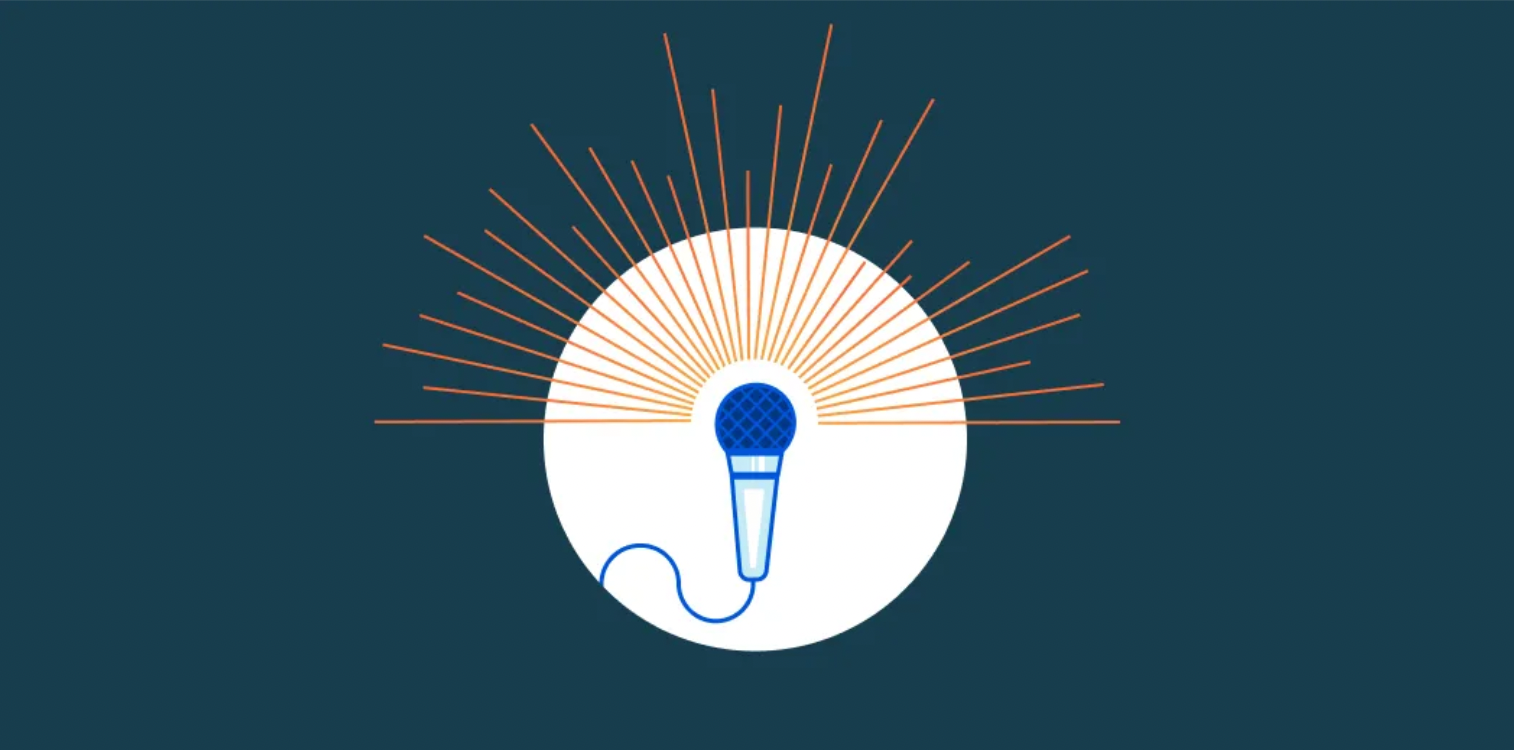
The Eurovision Song Contest has a history that goes back to 1956, so it's even older than the European Union and one of its highlights over the years was being the first global stage for the Swedish group ABBA — Waterloo won the 1974 edition). This year, for the 66th edition, we have a dedicated page for Eurovision fans, journalists or anyone interested in following Internet trends related to the event taking place in Turin, Italy.
The contest consists of two semi-finals and a final. The first semi-final is today, May 10, at 21:00 CEST, the second is Thursday, May 12, at 21:00 CEST. And the final is on Saturday, May 14, at 21:00 CEST. We are using Central European Summer Time and not our usual (on Radar) UTC because that’s the timezone of most of the 40 countries that will take part in the contest. There will be 17 countries in the first semi-final, 18 in the second, and 25 in the final (the full list is here).
First, you can see the Internet traffic aggregate in all the 40 countries that are participating in Eurovision 2022. There’s also a Continue reading
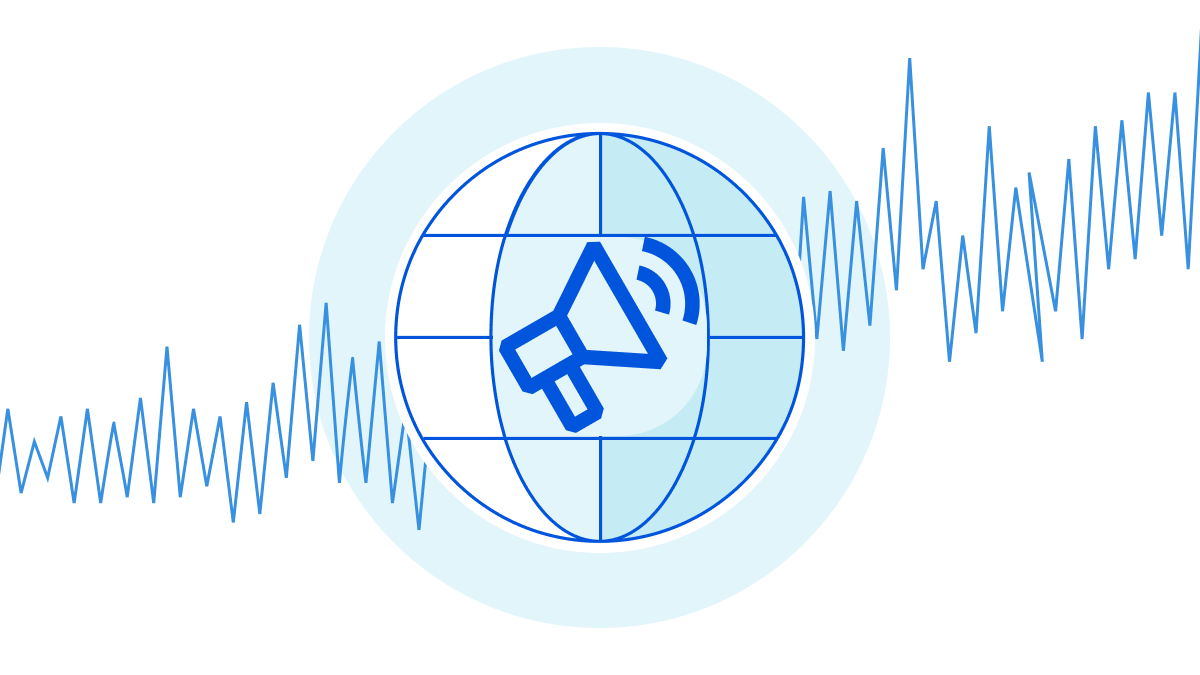
The Internet is not only a human right according to the United Nations, and a way to get information, but it has also become an important element in geopolitical conflicts, like the war going on in Ukraine. We have previously written about Ukrainians moving westward to escape the war and Internet outages in the country, but also about the importance of the open Internet in Russia.
Over this past week, we observed an outage in the occupied city of Kherson, south Ukraine, coupled with an apparent shift in who controls the Internet within the region. First, let’s give some context and show what we saw.
The Russian-occupied Kherson (a city of 280,000 people) experienced an Internet outage on Saturday, April 30, 2022, that began just after 16:00 UTC. The outage lasted until Wednesday, May 4, with traffic starting to return around 04:30 UTC traffic.

In the chart below, we can see that there was a 43% decrease in traffic from Kherson from February 23 to 24, after the war started. However, this weekend’s outage is the most significant disruption to Internet traffic in Kherson since the start of the war.

According to Ukraine’s vice Prime-Minister, Mykhailo Fedorov, and Continue reading


We blogged previously about some trends concerning the first round of the 2022 French presidential election, held on April 10. Here we take a look at the run-off election this Sunday, April 24, that ended up re-electing Emmanuel Macron as President of France.
First, the two main trends: French-language news sites outside France were clearly impacted by the local rule that states that exit polls can only be published after 20:00.
And Internet traffic was similar on both the election days (April 10 and 24) and that includes the increase in use of mobile devices and interest in news websites — there we also saw a clear interest in the Macron-Le Pen debate on April 20.
We have discussed before that election days usually don’t have a major impact on overall Internet traffic. Let’s compare April 10 with 24, the two Sundays when the elections were held. The trends throughout the day are incredibly similar (with a slight increase in traffic on April 24), even with a two-week gap between them.
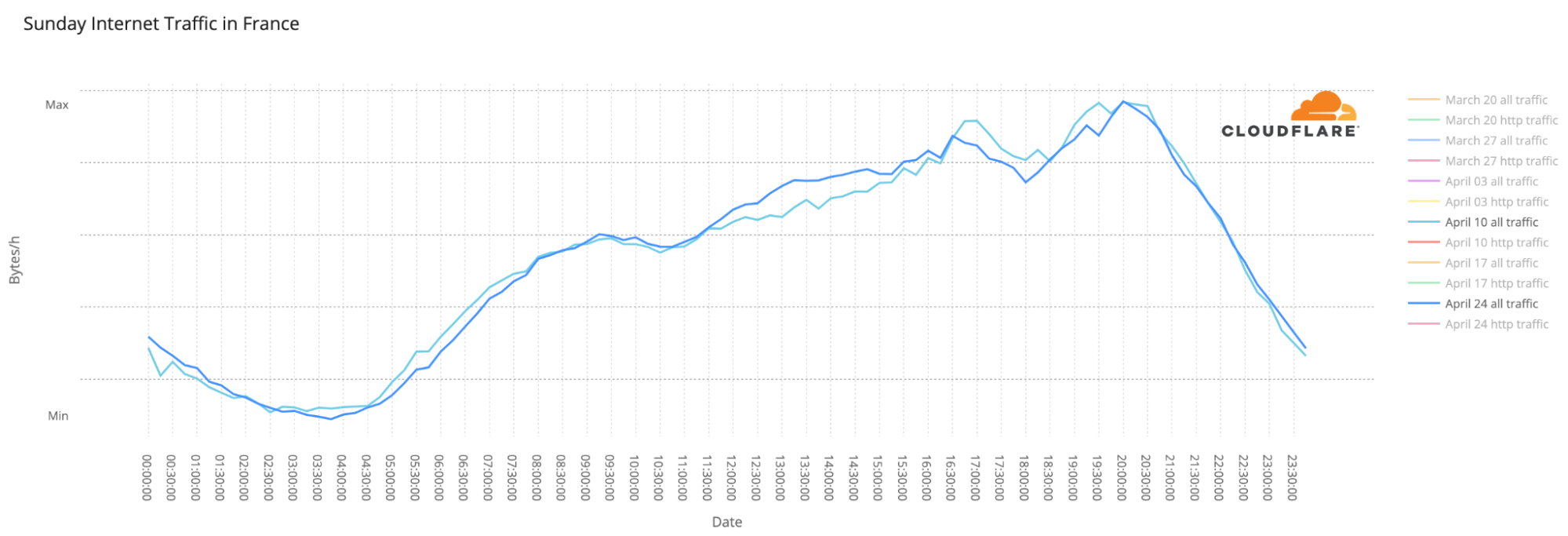
Another election-day trend is the use of mobile devices to access the Internet, mainly at night. The largest spikes in number of requests made using mobile devices in Continue reading


Nous avons publié un article de blog consacré à certaines tendances concernant le premier tour de l'élection présidentielle française de 2022, qui s'est déroulé le 10 avril. Nous nous intéressons ici au second tour de l'élection, qui a eu lieu le dimanche 24 avril et a abouti à la réélection d'Emmanuel Macron à la présidence de la France.
Tout d'abord, les deux principales tendances : les sites d'information francophones situés hors de France ont été clairement impactés par la réglementation locale, qui stipule que les estimations ne peuvent être publiées qu'après 20 heures.
Le trafic Internet a été similaire les deux jours de l'élection (les 10 et 24 avril), et cela inclut l'augmentation de l'utilisation des appareils mobiles et l'intérêt pour les sites d'actualités – - là aussi, nous avons constaté un net intérêt pour le débat Macron-Le Pen du 20 avril.
Nous avons déjà évoqué le fait que les jours d'élections n'ont généralement pas un impact majeur sur le trafic Internet global. Comparons les journées des 10 et 24 avril, les deux dimanches où ont eu lieu les élections. Les tendances tout au long de la journée sont incroyablement similaires (avec une légère augmentation du trafic le 24 Continue reading